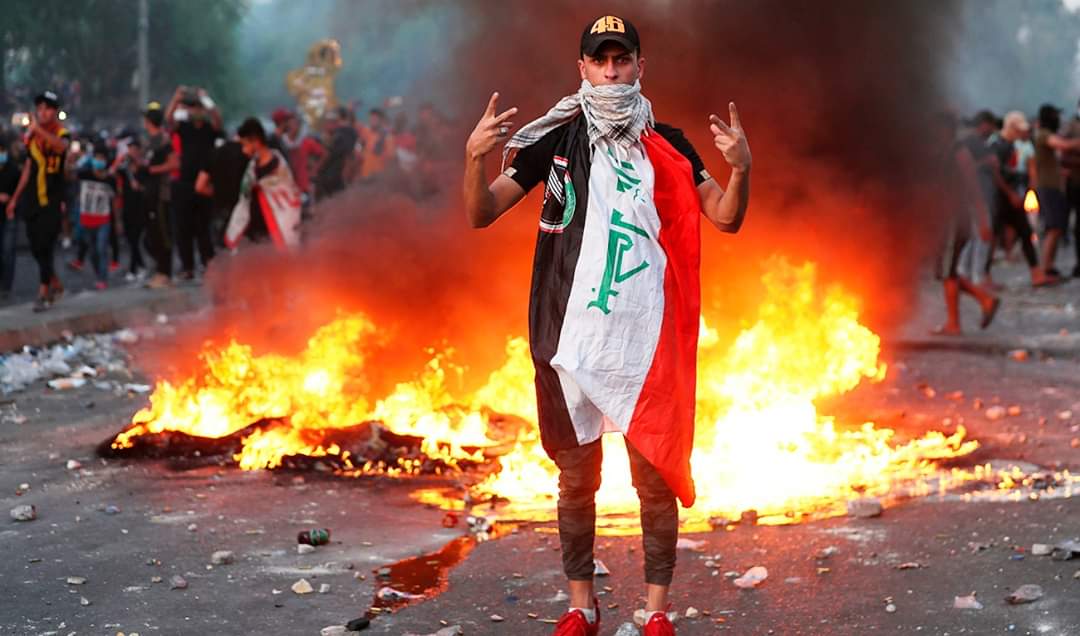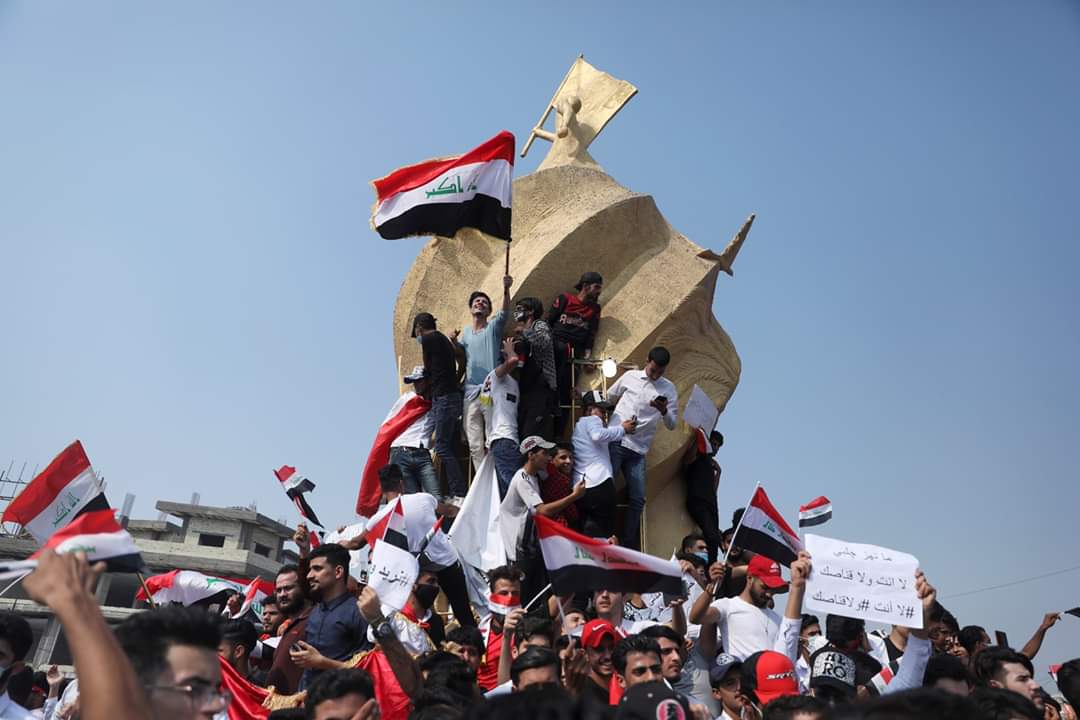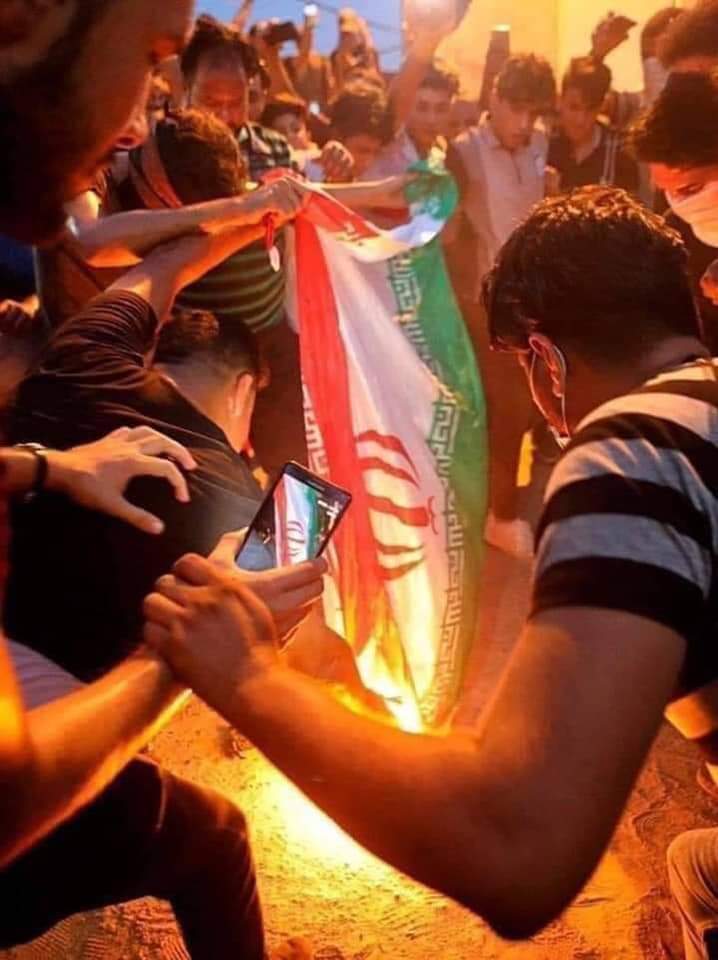Kidnapping and killing dissidents is the most common method of the Iranian regime. It has been pursued since the US invasion in 2003 so far.
Since nationwide protests in Iraq broke out on October 1, 2019, there are heartbreaking and unspeakable stories of assassinations whose protagonists are Iraqi activists partaking in the current anti-regime protests.
The Iraqi protests have turned bloody, seeing a high death toll that approached 500. There is another alarming phenomenon which amounted to be the hallmark of the protests in the country: Assassinating political and civil activists.
Killings and kidnappings against civil activists in the sectarianism-ridden country have surged over the past weeks. Five activists were killed in the span of two weeks.
Perpetrators are always anonymous. But the demonstrators, as well as reports and experts, suggest otherwise, asserting that the Iran-backed militias are behind the killings. The bullets of those militias are fired in order to put the ongoing massive uprising down.
Horror everywhere
Iraqi activists told RT channel that they are filled with fear and panic following the reports of assassinations of their fellow activists, the last of whom is the activist Ali Allami who died on December 10, 2019 when anonyms opened fire on him.
Bahaa Ali, one of the protesters at Tahrir Square, said he had not returned to his family for two weeks.
We could not get out of Tahrir Square. My wife has noticed that there are two cars keeping a close eye on our house for two consecutive days. We are living in complete horror and no one is coming forward to protect us.

Ali, who is keen to partake in the protests, said: “The danger which is surrounding us is tremendous. We have nothing but our unity to defend ourselves. We believe that the government is in complicity with these militias to kill us.”
A civil society activist in Iraq also said, “The armed militias are carrying out systematic kidnappings in order to subdue the protests. Such crimes were being committed while the government is just looking on. It did nothing to save us from this danger.”
Painful stories: from Haqqi al-Azawi to Zahra Ali
Al-Azawi is the last one among the activists assassinated in Iraq. Anonymous gunmen killed the civil activist Haqqi Ismail Abbas al-Azawi in mid-December.
According to activists, Al-Azawi was assassinated with a Kalashnikov in a drive-by killing in al-Shaab neighborhood in the Iraqi capital Baghdad. Activists said that the police station was only 20 meters away from the scene of assassination.
Azawi, who is affiliated with the Sadrist Movement, was killed in the same area where activist Ali Allami was assassinated a week earlier.
Only a few hours before assassinating Al-Azawi, anonymous militants opened fire on the vehicle of activist Mohammed Jassim al-Djaili on Palestine Street in Baghdad.
He was shot in the back and died on Sunday morning, shortly after being transferred to hospital.
Al-Djaili had been working to provide food assistance to protesters with the help of others. His relatives say that he had been keen to attend protests since they began.
In the same spot where Azawi’s life was taken out, activist Ali Allami was found dead. He was shot three times in the head from behind. He was heading to the home of his brother after he left Tahrir Square, the main spot of the Iraqi protesters’ bulk anti-government throngs.
Allami is a father of five. He was residing in the home of his brother to be close to the venue of the protests in Tahrir Square.
Ironically, Allami wrote on his Facebook account hours before assassination that “we will return home in coffins”.
One of the activists said that Allami, who hails from Al-Kut city south of Baghdad, left Tahrir Square at 1:00 PM as he headed to the home of his brother. He disappeared, and then we have found his body at 10:00 PM on a street in al-Shaab neighborhood.
Zahra Ali, an activist and a student in the Faculty of Arts, was kidnapped. Two days later, she was found dead. Kidnappers dumped her body in front of the house of her family on December 9.
Zahra used to distribute food and beverage to protesters in Tahrir Square.
Before being killed, she received death threats along with her father. But she did not back down from serving the protesters.
Ali Salman, Zahra’s father, says that reports suggest that she was electrocuted.
Known perpetrators
These stories are part of the inferno into which the Iraqi activists are thrown. But an important question pops up at this point: Why those activists are being killed? What is the scope of their role in the ongoing protests?
Those who follow up the activities of the Iraqi activists aimed to push the country forward on the path of democracy and rid it of foreign meddling will easily find the clues and decode the mystery of those activists’ assassinations.

According to Hassan Daioleslam, a leader within the National Council for Iran Resistance, the political arm of People’s Mujahedin of Iran (MEK), commented on the mounting assassinations targeting activists in the Iraqi capital Baghdad and the southern cities.
He said, “Militants who kidnap the activists from the protests in broad daylight are not totally unknown. They are completely known by the Iraqi people. They are members of groups loyal to the Iranian regime and they commit the crimes under direct guidance of the IRGC and the Iranian regime. Their leaders are Qassem Soleimani, chief of Qods Force, and Iraj Masjedi, Iran’s ambassador to Iraq.”
The kidnappings and assassinations targeting activists are carried out via ambushes which are set up at along distance from the spots where protesters gather, he noted.
Kidnapping and killing dissidents is the most common method of the Iranian regime. It has been pursued since the US invasion in 2003 so far.
The oppositionist also said that the pro-Iran militias in Iraq have killed thousands of scientific cadres, military personnel, specialists, political and civilian activists and others.
The Iranian regime stands behind all these killings with the aim of preventing the emergence of any disciplined political or social movement that could work against the Iranian regime in Iraq.
So, it is undisputed fact that the Iranian regime is killing the Iraqi political and civil activists. But why those people are killed? To which extent do they pose a danger to the Iranian regime?
The economy and boycott
Iraqi activists launched a campaign on social media in order to stand up to the Iranian expansionism. The aim of the campaign, launched under the theme ‘Let it get spoiled’, is aimed to boycott the Iranian products and exports, including milk, cheese, beverages and canned foodstuff items among others.
The campaign was launched earlier last month. They launched the hashtag ‘Let it get spoiled’ in response to the remarks of the pro-Iran clerics and senior Iranian leaders that outside parties are funding the protests in Iraq.

The campaign has taken a severe toll on the Iranian products, which have been piled on the market, with no buyers desiring to pick them. Iraqi social media users mentioned that they stand against the Iranian regime and those who are loyal to it. They are also against the ‘bad and expensive’ Iranian products.
Based on the foregoing, it is clear that the Iraqi activists have been, and are still, a stumbling block to the continuation of the Iranian grip over Iraq. They stir up protests, spread awareness and deal severe blows to the Iranian influence in the country.
Iran is wresting control over Iraq, controlling the political scene, hijacking the political decision-making, deploying militias and exploiting the oil-rich country’s resources for the sake of the Iranian interests.
So the activists are working to liberate their homeland. But the activists are patriotic ones who defend their own country, sacrificing their souls for that cause.
The assassinations, according to commentators, may succeed in the medium run in subduing the protests partially. But, in the long run, will cause hatred to be instilled in the hearts of the Iraqis towards Iran and its proxies in the country.
The activists’ sacrifices will lead to nothing but more gains for the Iraqi people, while assassination will lead to nothing but more losses for the Iranian regime, not only in Iraq, but also across the Middle East.
Mostapha Hassan Abdelwahab is the former editorial manager of the English edition of the Baghdad Post. He is focusing on Iraqi and Iranian affairs, with articles posted on the Herald Report, Vocal Europe and other platforms.